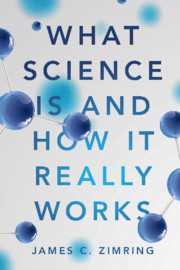Book contents
- What Science Is and How It Really Works
- What Science Is and How It Really Works
- Copyright page
- Dedication
- Contents
- Acknowledgments
- Introduction
- Part I
- 1 The Knowledge Problem, or What Can We Really “Know”?
- 2 Adding More Building Blocks of Human Reasoning to the Knowledge Problem
- 3 Holistic Coherence in Thinking, or Describing a System of How Humans Reason and Think
- Part II
- Part III
- About the Author
- Index
3 - Holistic Coherence in Thinking, or Describing a System of How Humans Reason and Think
from Part I
Published online by Cambridge University Press: 04 July 2019
- What Science Is and How It Really Works
- What Science Is and How It Really Works
- Copyright page
- Dedication
- Contents
- Acknowledgments
- Introduction
- Part I
- 1 The Knowledge Problem, or What Can We Really “Know”?
- 2 Adding More Building Blocks of Human Reasoning to the Knowledge Problem
- 3 Holistic Coherence in Thinking, or Describing a System of How Humans Reason and Think
- Part II
- Part III
- About the Author
- Index
Summary
Thus far we have drawn a picture of hypothetico-deductivism (HD), where one can predict outcomes from hypotheses, and where the validity of the hypotheses can be established by investigating whether the predicted outcomes actually occur. If the outcome does occur, then it shows the theory is correct; if the outcome doesn’t occur, then it shows the theory is false. This may sound straightforward on the surface, and this is the way science appears to be perceived by many in both the lay public and even by some scientists themselves, but, regrettably, such is not the case. This seemingly straightforward approach differs from how science is actually carried out, and this misperception is both a function of misrepresentation and misunderstanding. The reason for the misunderstanding will be explored later; here it is necessary to define why the testing of hypotheses cannot be as simple as it seems. A nuanced understanding of this issue could not be more essential for a proper understanding of science. It may seem odd, but there are serious problems with determining how evidence confirms a hypothesis and how evidence rejects it – indeed, it is not entirely clear or uncontroversial as to what exactly evidence is or can be claimed to be.
- Type
- Chapter
- Information
- What Science Is and How It Really Works , pp. 66 - 102Publisher: Cambridge University PressPrint publication year: 2019



